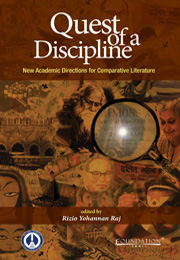Book contents
- Frontmatter
- Contents
- List of Contributors
- Acknowledgements
- Prologue to the “Quest'
- Introduction
- PART I Traditions and Manifestoes: Reflecting on Perspectives
- PART II The Quest Motif: Redefining the Scope of Comparative Literature
- PART III The Dynamics of Exchange: Genres, Areas and Disciplines
- PART IV India: A Curious Comparative Space
- Afterword: Comparative? Literature?
- Index
PART I - Traditions and Manifestoes: Reflecting on Perspectives
Published online by Cambridge University Press: 05 June 2012
- Frontmatter
- Contents
- List of Contributors
- Acknowledgements
- Prologue to the “Quest'
- Introduction
- PART I Traditions and Manifestoes: Reflecting on Perspectives
- PART II The Quest Motif: Redefining the Scope of Comparative Literature
- PART III The Dynamics of Exchange: Genres, Areas and Disciplines
- PART IV India: A Curious Comparative Space
- Afterword: Comparative? Literature?
- Index
Summary
Comparative Literature today seems a rather open space within the academy for different perspectives to meet, marry and/or part ways, with or without consequence. This openness has at once nourished and plagued this (inter)disciplinary site for a long time now. We have heard enough about the many crises, deaths and rebirths the discipline has gone through in the past two centuries. Even as the rare intertextual/ interdisciplinary space offered by Comparative Literature seems the singular academic site of any consequence and true promise as far as Literary Studies are concerned, it indeed becomes a difficult task for the comparatist to define the limits of this enterprise in our world of complex culturality. This section presents experts from three different academic milieus – Indian, European and American – reflecting on the history, methodology, scope and future of Comparative Literature in their respective contexts. Despite Rabindranath Tagore's early evocation of the possibility of conceptualizing a Viswa Sahitya and the establishment of a full-fledged department as early as 1954 at Jadavpur University, Comparative Literature in India is still a rather underdeveloped disciplinary site that has largely been dependent for its inspiration on the shifting European concerns, and has more recently been looking towards the American debates on World Literature and Multiculturalism for its sustenance. The uncertainty of Indian comparatists regarding methodology owes mainly to the multilingual, multi-cultural complex that Indian literature is. For this reason, Ipshita Chanda's seminal proposal of a workable methodology for this academic practice is sure to prove a guide for comparatists – teachers and students alike – in the country.
- Type
- Chapter
- Information
- Quest of a DisciplineNew Academic Directions for Comparative Literature, pp. 11 - 12Publisher: Foundation BooksPrint publication year: 2012

